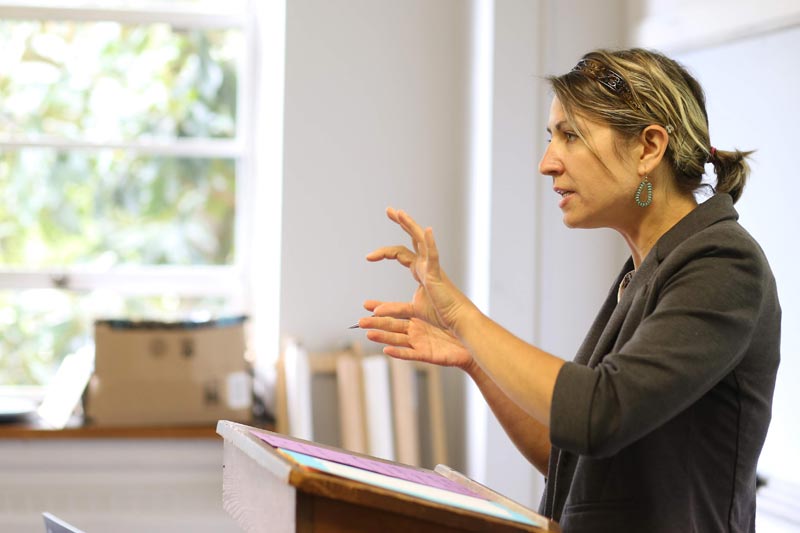Posted by: Kris Macomber, Adjunct, Sociology & Criminology

I spent several years teaching at a large, co-ed university. I enjoyed sharing the insights of sociology with students and helping them think more critically about the world around them. But the moment I stepped foot in the classroom at Meredith, I knew I had found something special.
What makes a women’s college unique is that it doesn’t just invite women to be public intellectuals, scientists, artists, and innovators, it expects them to be these things. It creates space for women’s intellectual development while also empowering them to reach their goals. Here are some of the things you can expect in a women’s college learning environment.
All too often in our culture, women get the message early in life that what’s most important is how they look. We warn little girls not to be “bossy” and we tell young women to “smile more” so they can be professional and “likeable.” These are not messages we typically direct at boys and young men. When you pair this with the widespread sexualization of women in the media, it’s no surprise researchers find a confidence gap between women and men college graduates on the job market.
Cultural messaging and outdated gender expectations distract women and girls from seeing themselves as scientists, as lawmakers, as engineers, as innovators, as businesswomen, as leaders, and perhaps most importantly, as change agents. Although much progress has been made, research consistently shows how gender gaps in occupations, wages, and leadership continue to impact women today. This is why the learning environment at a women’s college is so important – because it creates spaces for students to discover and develop their intellectual identity.
On the first day of classes several years ago, I asked my Sociology 100 class what they hoped to learn that semester. One student said, “I’ve always had strong opinions about social issues, but I don’t really know how to articulate them well. I’m not good at making an argument.” She had hoped that learning about sociology and being at Meredith would help her be a better discussant of current social issues. When this student graduated four years later, she was a double major in International Studies and Sociology and she presented her senior research at an academic conference, to a room full of professional sociologists. She was also the President of a student club that advocates for gender justice for all people. This student, like countless others, found her voice at Meredith. Perhaps in ways she never even anticipated.
In my sociology and criminology classes, I teach about topics that directly impact women today, such as domestic and sexual violence, the gender wage gap, the underrepresentation of women in certain professions, the impacts of women’s incarceration on children and families, and the very existence of our gender binary. These are complex issues that require complex solutions and our students are thrust right into the center of these discussions. Sometimes these difficult topics nudge students past their comfort zones. Ultimately, though, this is when deep, transformational learning occurs.
We spent time in one class discussing how college campuses can address the needs of transgender and gender non-conforming students. These are critical issues that not only impact college campuses but society more broadly. Creating space for students to raise critical questions about this issue and devise possible solutions helps prepare them for confronting new challenges in their professional and personal lives. In other words, we don’t shy away from or evade difficult conversations. We confront them. And while we don’t have all the answers, we roll up our sleeves, we dig into the issues, and we continue to ask important questions.
As part of my teaching strategy, I often invite accomplished, professional women who are working to address various social problems into my classroom to share their expertise and experiences. Not only are these terrific networking opportunities for students, but students also get to see what awaits them after college. They get to imagine themselves as experts in their own line of work. The classroom-to-career pathway is not just theoretical for them, but practical and attainable. This kind of interactive learning is helpful for building competency and confidence.
To me, there are few things that matter more than teaching students how to think more critically about the world around them. When you pair this rigorous intellectual skill with the confidence and drive to do something with it, you get students who will change the world. These are Meredith students.
Sign up for our blog and get tips to help you write a strong college application essay. You’ll also receive valuable information every week to help you with your college search, including how to tell if a school is a good fit, how to pay for college, and more!
Share This Page
Office of Admissions
1st Floor, Johnson Hall
1-800-MEREDITH
(919) 760-8581
(919) 760-2348
admissions@meredith.edu
PRINCETON REVIEW
U.S. NEWS
NICHE
3800 Hillsborough Street Raleigh, NC 27607-5298 | (919) 760-8600 Fax: (919) 760-8330 | © 2024 All Rights Reserved.